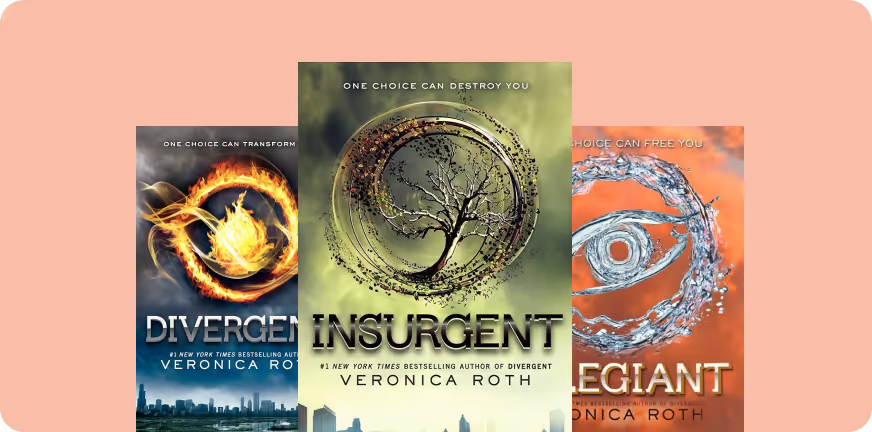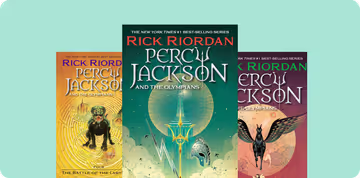Divergent Books in Order

The Divergent series by Veronica Roth is a captivating dystopian trilogy set in a future Chicago, where society is divided into five factions based on virtues.
If you're looking for the Divergent Books in Order, here’s the complete list of the main trilogy along with related novellas and short stories:
Main Trilogy
- Divergent (2011)
- Insurgent (2012)
- Allegiant (2013)
Novellas and Short Stories
- Free Four: Tobias Tells the Divergent Knife-Throwing Scene (2012) - A retelling of a pivotal scene from Divergent from Tobias's perspective.
- The Transfer (2013) - Focuses on Tobias Eaton's backstory and his Choosing Day.
- The Initiate (2014) - Explores Tobias's experience during Dauntless initiation.
- The Son (2014) - Chronicles Tobias's struggles within the Dauntless faction.
- The Traitor (2014) - Takes place two years after The Son, detailing Tobias's actions as he uncovers a plot against his faction.
- We Can Be Mended (2017) - A short epilogue set five years after Allegiant.
Companion Collection
- Four: A Divergent Collection (2014) - This book compiles the four novellas mentioned above, providing a deeper insight into Tobias's character.
This structured order allows readers to follow the main storyline while also exploring additional perspectives and backstories that enrich the Divergent universe.
Overview of the Divergent Series
Divergent
The first book introduces us to Beatrice "Tris" Prior, who lives in Abnegation, a faction that values selflessness.
At the age of sixteen, Tris must choose her faction during the Choosing Ceremony.
- Choosing Dauntless: Tris feels a strong pull towards Dauntless, known for bravery. She makes the bold decision to leave her family and join this faction.
- Discovering Divergence: During her initiation, Tris learns she is Divergent, meaning she fits into multiple factions. This secret puts her life at risk as the ruling Erudite faction seeks to eliminate Divergents who threaten their control.
- Romance and Conflict: Tris develops a romantic relationship with Tobias Eaton (Four), a fellow initiate. Together, they uncover a conspiracy led by Erudite's leader, Jeanine Matthews, which aims to overthrow the government and control the factions.
Insurgent
The second installment picks up right after the events of Divergent.
- Alliances Formed: Tris and Tobias rally support from other factions and the Factionless to combat Jeanine's tyranny.
- Struggles and Sacrifices: As they navigate betrayals and battles, Tris grapples with her identity and the consequences of her choices. The story intensifies as they confront Jeanine's plans and fight for their survival.
- Climactic Showdown: The book culminates in a fierce confrontation against Jeanine, leading to significant changes in faction dynamics.
Allegiant
The final book shifts perspectives between Tris and Tobias as they explore life beyond the walls of Chicago.
- Revelations: They discover that their society is part of a larger experiment aimed at creating genetically pure Divergents. This revelation shakes their understanding of their identities and purpose.
- Civil War Looms: The characters must navigate alliances with both Factionless and Allegiant rebels while facing internal conflicts that threaten to tear them apart.
- Tragic Endings: The series concludes with heart-wrenching sacrifices that redefine their world. Tris’s ultimate fate serves as a poignant commentary on bravery and selflessness.
Character Profiles in Divergent
The Divergent series features a rich cast of characters, each embodying distinct traits and complexities that contribute to the narrative's depth.
Here are some key character profiles:
- Beatrice "Tris" Prior: The protagonist who transitions from the selfless Abnegation faction to the brave Dauntless. Tris is determined, courageous, and struggles with her identity as a Divergent, which makes her a target in her society.
- Tobias "Four" Eaton: Tris's love interest and a fellow initiate in Dauntless. He has a troubled past with an abusive father and is also Divergent. Four is known for his strength and leadership qualities.
- Caleb Prior: Tris's brother who chooses to join Erudite, contrasting with Tris's choice. His character explores themes of family loyalty and personal ambition.
- Peter Hayes: An antagonist who transfers from Candor to Dauntless. He is cruel and competitive, often bullying Tris and her friends during initiation.
- Tori Wu: The Dauntless tattoo artist who recognizes Tris as Divergent during her aptitude test. Tori has her own tragic backstory related to the treatment of Divergents.
These characters not only drive the plot but also embody the series' exploration of identity, choice, and societal roles.
Themes Explored in Divergent
The Divergent series delves into several significant themes that resonate throughout the narrative:
- Identity: A central theme where characters, particularly Tris, grapple with their sense of self amidst societal expectations and personal choices.
- Fear: The series examines the nature of fear and bravery, questioning what it means to be courageous in a world structured around these concepts.
- Society and Class: The division of society into factions based on virtues raises questions about social structure, belonging, and the implications of such divisions on individual identity.
- Family: Tris's relationship with her family is pivotal; her choice to leave Abnegation reflects her struggle between familial loyalty and personal freedom.
- Power: The dynamics of power play a crucial role in the story, highlighting how it can be wielded for control or resistance within the faction system.
Reading Order for Newcomers
For newcomers interested in exploring the Divergent series, here’s the recommended reading order:
- Divergent (2011)
- Free Four: Tobias Tells the Divergent Knife-Throwing Scene (2012) - A short story offering insight from Tobias's perspective.
- Insurgent (2012)
- Allegiant (2013)
- We Can Be Mended (2017) - A short epilogue set five years after Allegiant.
This order allows readers to experience the main storyline while also enjoying additional perspectives that enhance their understanding of the characters and theme.
Comparisons with Other Dystopian Series
The Divergent series shares several thematic and narrative similarities with other popular dystopian series, making it a notable entry in the genre.
Here are some key comparisons:
1. The Hunger Games
Both series feature strong female protagonists—Katniss Everdeen in The Hunger Games and Tris Prior in Divergent—who challenge oppressive societal structures.
They navigate dangerous environments where survival and rebellion against authoritarian regimes are central themes.
However, while The Hunger Games focuses heavily on survival and the brutality of televised death matches, Divergent emphasizes identity and the struggle to fit into a faction-based society.
2. The Maze Runner
Like Divergent, The Maze Runner presents a group of young people facing life-threatening challenges in a controlled environment.
Both series explore themes of friendship, loyalty, and the quest for truth amidst manipulation by powerful entities.
However, The Maze Runner leans more towards action and mystery, while Divergent delves deeper into character development and moral dilemmas associated with choice.
3. Legend
This series also features a dystopian society divided by class and power struggles.
Both Divergent and Legend include elements of rebellion against corrupt governments, but Legend places more emphasis on the dual perspectives of its protagonists, June and Day, allowing for a broader exploration of their world’s complexities.
4. Uglies
In Scott Westerfeld's Uglies, society enforces conformity through mandatory cosmetic surgery at age 16, paralleling the faction system in Divergent.
Both series critique societal pressures regarding beauty and identity, highlighting the importance of individuality in a conformist world.
These comparisons illustrate how Divergent fits within a broader landscape of dystopian literature while also carving out its unique identity through its focus on personal choice and self-discovery.
Behind the Scenes: The Adaptation to Film
The film adaptation of Divergent, released in 2014, brought Veronica Roth's popular novel to the big screen under the direction of Neil Burger.
The adaptation process involved several key developments:
Casting Choices
Shailene Woodley was cast as Tris Prior, alongside Theo James as Tobias "Four" Eaton.
The casting aimed to capture the essence of the characters as described in the book.
Critics noted Woodley's performance effectively conveyed Tris's internal struggles and growth throughout her journey.
Changes from Book to Film
While the film retained many core elements from the novel, it also made significant changes.
Some characters from the book were omitted or altered, which sparked discussions among fans regarding their importance to the story's depth.
For instance, characters like Uriah and Marlene were left out, potentially impacting later films' narratives.
Visual Representation
The filmmakers aimed to create a visually captivating representation of Roth's dystopian Chicago.
The film utilized impressive special effects to depict action sequences, such as Tris's zip-lining across buildings during her initiation into Dauntless.
However, some critics felt that certain scenes lost their darker tones from the book, opting instead for a more action-oriented approach.
Production Timeline
Development began in March 2011 when Summit Entertainment acquired film rights. Principal photography took place primarily in Chicago from April to July 2013, with additional reshoots occurring in early 2014.
The film was produced with a budget that ultimately reached around $85 million due to its anticipated success.
Overall, while the film adaptation of Divergent received mixed reviews—praised for its visual appeal but criticized for its departures from the source material—it successfully introduced audiences to Roth's compelling world.
The adaptation set the stage for subsequent films in the series but also raised questions about how faithfully future installments would represent the original narrative.
Fan Theories and Interpretations
The Divergent series has sparked numerous fan theories and interpretations that delve into its complex themes and character dynamics.
Here are some notable theories:
Divergent as a Metaphor for Identity
Many fans interpret the concept of being Divergent as a metaphor for the struggle of identity in a conformist society.
Tris's ability to fit into multiple factions symbolizes the multifaceted nature of human identity, suggesting that people cannot be easily categorized.
This theory resonates with readers who feel pressure to conform to societal norms.
The Role of Fear in Society
Another prevalent theory focuses on the role of fear within the faction system.
Fans speculate that the fear landscapes used during initiation serve as a means of control, reflecting how societies manipulate fear to maintain power.
This interpretation highlights the psychological aspects of governance and social order, suggesting that true bravery involves confronting one's fears rather than succumbing to them.
The Fate of the Factionless
The fate of the Factionless is a topic of much debate among fans.
Some theorize that the Factionless represent those marginalized by society, and their eventual uprising signifies a rebellion against oppressive systems.
This interpretation aligns with real-world social movements, drawing parallels between the fictional world and contemporary issues of inequality and disenfranchisement.
Tobias’s Emotional Journey
Fans also explore Tobias "Four" Eaton's character arc, theorizing that his journey represents the struggle between vulnerability and strength.
His abusive past shapes his relationships and decisions throughout the series, leading to discussions about masculinity, trauma, and healing.
Many readers appreciate how his character evolves alongside Tris, emphasizing the importance of support in overcoming personal demons.
These theories and interpretations enrich the reading experience, allowing fans to engage with the text on deeper levels and fostering community discussions about its meanings.
FAQs About the Divergent Series
To help clarify common questions about the Divergent series, here are some frequently asked questions:
1. What is the main premise of Divergent?
Divergent is set in a dystopian future where society is divided into five factions—Abnegation, Erudite, Dauntless, Amity, and Candor—each representing specific virtues.
The story follows Beatrice "Tris" Prior as she navigates her identity after being labeled "Divergent," meaning she fits into multiple factions.
2. Who are the main characters?
The main characters include:
- Tris Prior: The protagonist who transitions from Abnegation to Dauntless.
- Tobias "Four" Eaton: Tris's love interest and a fellow initiate with a troubled past.
- Caleb Prior: Tris's brother who chooses to join Erudite.
- Jeanine Matthews: The antagonist and leader of Erudite who seeks to control society.
3. What are the major themes in Divergent?
Key themes include identity, fear, societal structure, family loyalty, and power dynamics.
The series explores how these themes impact individual choices and relationships within a divided society.
4. How does the series end?
In Allegiant, Tris and Tobias discover truths about their society that challenge everything they believed.
The conclusion is bittersweet as it addresses themes of sacrifice and redemption while leaving readers with questions about identity and belonging.
5. Are there any related works?
Yes! In addition to the main trilogy (Divergent, Insurgent, Allegiant), there is a collection of novellas titled Four: A Divergent Collection, which provides additional insights into Tobias's character.
Additionally, We Can Be Mended serves as an epilogue set years after the events of Allegiant.
Conclusion: Why You Should Read Divergent
The Divergent series, authored by Veronica Roth, has become a cornerstone of young adult dystopian literature, captivating readers with its intricate world-building and compelling characters.
Here are several reasons why you should consider diving into this enthralling trilogy:
Engaging Narrative and Themes
At its core, Divergent is not just a story about a divided society; it explores profound themes such as identity, fear, and rebellion against oppressive systems.
Tris Prior's journey of self-discovery resonates with readers who grapple with their own identities in a world that often imposes rigid expectations.
The series invites readers to reflect on the nature of bravery and the choices that define us, making it a thought-provoking read.
Strong Character Development
The character arcs in Divergent are richly developed, particularly that of Tris and her love interest, Tobias "Four" Eaton.
Their evolution from uncertain teenagers to resilient leaders is both inspiring and relatable.
Readers witness Tris confront her fears and make difficult choices, which adds depth to her character and fosters a strong emotional connection with the audience.
A Reflection of Contemporary Issues
The themes presented in Divergent mirror real-world issues such as societal division, the struggle for personal freedom, and the consequences of authority.
As young adults navigate their own paths in an increasingly complex world, the series offers valuable insights into the importance of questioning societal norms and standing up for one's beliefs.
Fast-Paced and Captivating
Roth's writing style is engaging and accessible, making the books a quick yet immersive read.
The fast-paced plot filled with action, intrigue, and unexpected twists keeps readers on the edge of their seats.
This combination of excitement and depth makes Divergent an appealing choice for both avid readers and those new to the genre.
Cultural Impact and Adaptations
Since its release, Divergent has left a significant mark on popular culture, inspiring discussions about its themes and characters.
The successful film adaptations further broadened its reach, introducing the story to new audiences while maintaining the essence of Roth's vision.
For fans of dystopian narratives, experiencing both the books and films can provide a richer understanding of the story.
In conclusion, reading Divergent offers not only an engaging escape into a vividly imagined world but also an opportunity for introspection about identity, choice, and societal structures.
Whether you are drawn in by the action-packed plot or the thought-provoking themes, Divergent is a series that promises to leave a lasting impression.
If you haven’t yet embarked on this journey with Tris Prior, now is the perfect time to discover why this series continues to resonate with readers around the globe.




